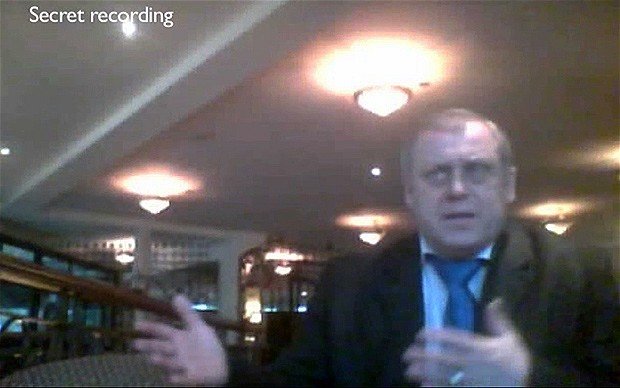
Volodymyr Gerashchenko, a senior Ukrainian Olympic official, has been suspended after a BBC investigation showed he was willing to unofficially sell 2012 tickets for cash.
Volodymyr Gerashchenko, of Ukraine’s National Olympic Committee (NOC), told a reporter posing as a UK tout he would have up to 100 tickets to sell.
It is a criminal offence, punishable by fines of up to £20,000 ($32,000), to sell London 2012 tickets to touts.
Volodymyr Gerashchenko claimed he had “never planned to sell tickets in the UK”.
Ukrainian Olympic chief Sergei Bubka said he called Volodymyr Gerashchenko in Kiev on Tuesday to tell him he was suspended pending an investigation.
Strict rules, applying to countries outside the European Union, say tickets can only be sold to those who are resident within that country to stop tickets entering the black market.
BBC London has previously uncovered how some official ticket resellers were flouting the London Olympic Games and Paralympic Games Act, designed to stop Olympic tickets entering the black market.
After receiving information that someone from Ukraine’s national Olympic committee might be prepared to sell tickets, a BBC reporter posing as an unauthorized ticket dealer from the UK spoke to Volodymyr Gerashchenko who confirmed he would be prepared to sell tickets.
Volodymyr Gerashchenko, who has been general secretary of his national Olympic committee since 1997, told an undercover reporter: “I understand you’re a dealer – that’s why for me, you are priority number one, the top, the person, in case we have extra tickets to contact you, we contact you.”

During a subsequent meeting at a hotel near the Olympic Park in east London, Volodymyr Gerashchenko explained he was in the process of distributing tickets to Ukrainian fans, coaches and officials.
However, once this process had finished, he would be prepared to sell up to 100 spare tickets.
Asked by the undercover journalist if payment could be made by bank transfer he replied: “I think it is when it comes, better cash. Possible?
“Better cash and finished with it. I hope to arrive 10 July.”
When asked by the BBC why he was prepared to break Olympic rules and UK law in offering his country’s Olympic tickets on the black market, Volodymyr Gerashchenko claimed he had “never planned to sell tickets in the UK” and had been making “diplomatic talk to satisfy the persistent interest of the ticket dealer”.
Volodymyr Gerashchenko said: “We have more demand than the number of tickets so we will use all tickets allocated to the NOC of Ukraine. We will need more tickets and we will try to find them on the LOCOG Exchange page.”
He said that the meeting with the undercover reporter “was unofficial, with no intention to make any real deal”, either in writing or verbally.
Adding: “All points that [the reporter] mentioned were not [the] subject of any deal. I have nothing to propose. I did not have real tickets to sell.
“I agreed to do this meeting only for the reason not to offend the person from the host-country who asked me several times for a meeting.”
Former Olympic Minister Tessa Jowell MP has now called for an investigation.
“I think it’s shocking, here’s somebody who’s exploiting the system and if the charge against them is proven, the sanctions are very heavy,” she said.
A spokesperson for the International Olympic Committee (IOC) said: “We take these allegations very seriously indeed. If proven we will not hesitate to impose tough sanctions.”
Jeremy Summers, an expert in sports law who provided legal counsel at the Sydney 2000 Olympic Games, said the latest revelations were particularly embarrassing for the IOC.
“The IOC tried to sharpen its act for itself and the various other Olympic committees, following the scandals of the late 1990s (namely, allegations of bribery to win the right to host the 2002 Winter Olympics in Salt Lake City).
“We’ve given a higher allocation of tickets to the NOCs than we’ve ever done before. It looks like it stinks. It’s something you shouldn’t be seeing happening.”
Olympic organizers, LOCOG and officers from the Metropolitan Police’s dedicated Operation Podium team have vowed to clamp down on unauthorized ticket reselling, which is expected to soar after the last remaining tickets go on sale to the public this week.
A London 2012 spokesperson said: “We take these allegations extremely seriously. We have asked the BBC for full access to the evidence and we will investigate straight away.
“If these allegations are true, we are prepared to take tough and immediate action.”
A Metropolitan Police spokesperson said: “We have made contact with BBC London as we would like to see all of the material which they have so that we can carry out a full assessment of it.”
Scotland Yard added: “The safest way for the public to purchase tickets for the Olympic and Paralympic Games is from the London 2012 website.
“If you buy from an unofficial site or from a tout, you risk paying over the odds for a ticket that may not exist, may not be genuine and you risk not getting to see the Games. Your personal details could even be used in other crimes.”
Ukraine secured 27 medals at the Beijing games, ranking the country at number 11 in the world in terms of medal achievement.